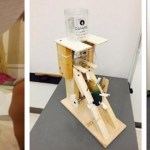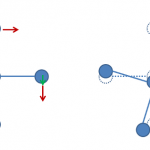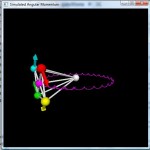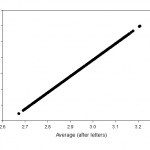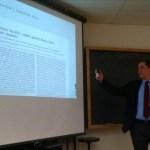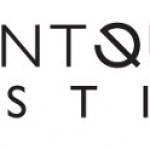education
We're into admitted student season, that muddy period when large numbers of anxious high-school seniors visit college campuses all over the nation, often with parents in tow, trying to decide where to spend the next four years. As a result, I'll be spending a good deal of time over the next few weeks talking to high-school students who are interested in physics, trying to convince them to come here.
So, since I'm putting time into that anyway, I typed out a version of the argument in favor of going to a small liberal arts college (Williams, or Union, or some lesser school) to major in science…
“The first duty of every Starfleet officer is to the truth, whether it’s scientific truth or historical truth or personal truth! It is the guiding principle on which Starfleet is based. And if you can’t find it within yourself to stand up and tell the truth about what happened, you don’t deserve to wear that uniform!” -Captain Picard
The scientific story of the Universe is a remarkable one. All at once, it's exciting, it's the very frontiers of knowledge and discovery, and and it's always going forward. As time goes on, we're continuously discovering new things that surprise us, and it's…
Thanks to the federal School Breakfast Program, millions of low-income children have the opportunity to start the school day with a healthy meal. But does the program impact the brain as well as the belly? A new study finds that it does, with students at participating schools scoring higher in math, reading and science.
A striking illustration of the connections between nutrition and education, the study not only found higher academic scores within schools that participate in the School Breakfast Program, it also found that the effect was cumulative. In other words, the longer the school…
A few years ago, I taught one of our "SRS" classes, which are supposed to introduce students to research at the college level-- I blogged about it while the course was in progress. I taught it again in the recently-concluded Winter term, but didn't blog much about it because I was mostly doing the same stuff as last time. I did re-adjust the content a little, as I've changed some things about the way I like to present stuff since 2012, but they were mostly cosmetic tweaks, with one big exception.
In the previous round, I went with the base course description, which just specifies that…
Everybody and their extended families has been sharing around the Fareed Zakaria piece on liberal education. This, as you might imagine, is relevant to my interests. So I wrote up a response over at Forbes.
The basic argument of the response is the same thing I've been relentlessly flogging around here for a few years: that while I'm all for a broad education, the notion that studying a STEM subject and studying "the human condition" are in opposition or even cleanly separable is just foolish. But it's a great excuse to start that argument at Forbes, so...
In a somewhat frightening illustration of anti-vaccine trends, a new report estimates that among groups affected in the recent measles outbreak, the rates of measles-mumps-rubella immunization might have been as low as 50 percent.
Earlier this month, a report published in JAMA Pediatrics concluded that MMR vaccination rates in many of the populations affected by the Disneyland-related measles outbreak are well below the necessary numbers to maintain herd immunity. Led by researchers at Boston Children’s Informatics Program, the project used disease data from the California Department of…
That's the title of the talk I gave yesterday at Vanderbilt, and here are the slides:
Talking Dogs and Galileian Blogs: Social Media for Communicating Science from Chad Orzel
The central idea is the same as in past versions of the talk-- stealing Robert Krulwich's joke contrasting the publication styles of Newton and Galileo to argue that scientists spend too much time writing technical articles aimed at an audience of other experts, and need to do more "Galileian" publication aimed at a broad audience. And that social media technologies offer powerful tools that can enable those who are…
I mentioned last week that I'm giving a talk at Vanderbilt tomorrow, but as they went to the trouble of writing a press release, the least I can do is share it:
It’s clear that this year’s Forman lecturer at Vanderbilt University, Chad Orzel, will talk about physics to almost anyone.
After all, two of his popular science books are How to Teach Physics to Your Dog and How to Teach Relativity to Your Dog. Orzel, an associate professor of physics at Union College in New York and author of the ScienceBlog “Uncertain Principles,” is scheduled to speak on campus at 3 p.m. Thursday, March 26.
As…
Yesterday's post about VPython simulation of the famous bicycle wheel demo showed that you can get the precession and nutation from a simulation that only includes forces. But this is still kind of mysterious, from the standpoint of basic physics intuition. Specifically, it's sort of hard to see how any of this produces a force up and to the left, as required for the precession to happen.
I spent a bunch of time last night drawing pictures and writing equations, and I think I have the start of an explanation. It all comes down to the picture of rigid objects as really stiff springs-- the grey…
The third of the great physics principles introduced in our introductory mechanics courses is the conservation of angular momentum, or the Angular Momentum Principle in the language of the Matter and Interactions curriculum we use. This tends to be one of the hardest topics to introduce, in no small part because it's the last thing introduced and we're usually really short on time, but also because it's really weird. Angular momentum is very different than linear momentum, and involves all sorts of vector products and things going off at right angles.
This leads to some of the coolest demos…
Workplace suicides took a sharp upward turn in 2008, with workers in the protective services, such as police officers and firefighters, at greatest risk, a new study finds. Researchers say the findings point to the workplace as a prime location for reaching those at risk with potentially life-saving information and help.
According to the study, which was published this month in the American Journal of Preventive Medicine, 1,719 people died by suicide in U.S. workplaces between 2003 and 2010, with an overall rate of 1.5 per 1 million workers. Workplace suicide rates had been on the decrease,…
Yesterday's quick rant had the slightly clickbait-y title "GPAs are Idiotic," because, well, I'm trying to get people to read the blog, y'know. It's a little hyperbolic, though, and wasn't founded in anything but a vague intuition that the crude digitization step involved in going from numerical course averages to letter grades then back to multi-digit GPA on a four-point scale is a silly addition to the grading process.
But, you know, that's not really scientific, and I have access to sophisticated computing technology, so we can simulate the problematic process, and see just how much…
I was thinking about something only tangentially related to grading, when it struck me that the way we go about generating student grade point averages is the kind of mind-bogglingly stupid system that requires lots of smart people working together to produce. Two very different groups of smart people, with very different ways of looking at the world.
As a scientist, the starting point for assigning grades is generally a set of scores on a bunch of individual assessments. These are generally combined to form some sort of weighted average, which can be expressed as something like a percentage…
I keep forgetting to mention these, but I have two talks coming up:
1) Tonight, March 17, I'm talking about Eureka to the Mid-Hudson Astronomical Association on the campus of SUNY New Paltz. This is a version of the talk I gave in Bristol, UK over the summer, but with the soccer content replaced with American football.
2) Next Thursday, March 26, I'll be giving a Forman Lecture as part of the Vanderbilt University Physics Colloquium (following in Rhett's footsteps...). This is going to be a revised version of the social-media talk I've given in the past. I need to blow that up and put it back…
It's always a pleasure to see former students doing well, and to that end, we invited one of my former thesis students, Mike Mastroianni, class of 2007, to give a colloquium talk last week in the department. Mike went to physics grad school for a couple of years after graduation, but decided he was more interested in education issues, and is now in the process of writing his dissertation (to be defended in a few weeks) in a Curriculum and Instruction program at the University at Albany.
He gave a really interesting talk on his thesis work, looking at the evolution of gender ratios in STEM…
Naturopathy is 80% quackery, 19% science-based modalities like diet, exercise, and lifestyle changes rebranded and infused with woo, and maybe 1% valid medicine. Yes, I know I'm probably being generous given that naturopathy is based on a vitalistic, prescientific worldview and originated in the 19th century German "natural living" movement, but I'm in a generous mood right now. The reason I'm in a generous mood is not because naturopathy has suddenly become less quackery than it was. Just view a few of my posts on naturopathy if you think my opinion's changed. I still believe that…
SteelyKid's school does a "March Math Madness" thing, and this year all the kids in her class are being asked to practice "Math Facts" for ten minutes a night. This appears to be motivated by some requirement that students be able to rattle off basic addition problems at high speed. So there are flash cards and the like.
She's good at this, but quickly gets bored, and does not hesitate for an instant in letting her boredom be known. It'll be sort of interesting to see how this plays out if they actually expect her to answer 30 addition questions in a minute, or whatever the ridiculous…
A few years back, I became aware of Mike Brotherton's Launch Pad Astronomy Workshop, and said "somebody should do this for quantum physics." At the time, I wasn't in a position to do that, but in the interim, the APS Outreach program launched the Public Outreach and Informing the Public Grant program, providing smallish grants for new public outreach efforts. So, because I apparently don't have enough on my plate as it is, I floated the idea with Steve Rolston at Maryland (my immediate supervisor when I was a grad student), who liked it, and we put together a proposal with their Director of…
Back on Thursday when I was waiting to be annoyed by a speech, one of the ways I passed time was reading stuff on my phone, which included This Grantland piece about Charles Barkley and "advanced stats". In it, Bryan Curtis makes the argument that while Barkley's recent comments disparaging statistical tools seem at first like just the same old innumeracy, it's really a question of ownership.
But Barkley was firing a shot in a second war. Let’s call it Moneyball II. This clash doesn’t pit a blogger versus a newspaperman in a debate over the value of PER. It pits media versus athletes in a…
Yesterday was Founders Day at Union, celebrating the 220th anniversary of the granting of a charter for the college. The name of the event always carries a sort of British-boarding-school air for me, and never fails to earworm me with a very particular rugby song, but really it's just one of those formal-procession-and-big-speaker events that provide local color for academia.
This year's event started, as always, with a classical music performance-- a song by Aaron Copeland, this time, so we've at least caught up to the 20th Century. (I'm not sure I want to live long enough to see a Bob Dylan…

